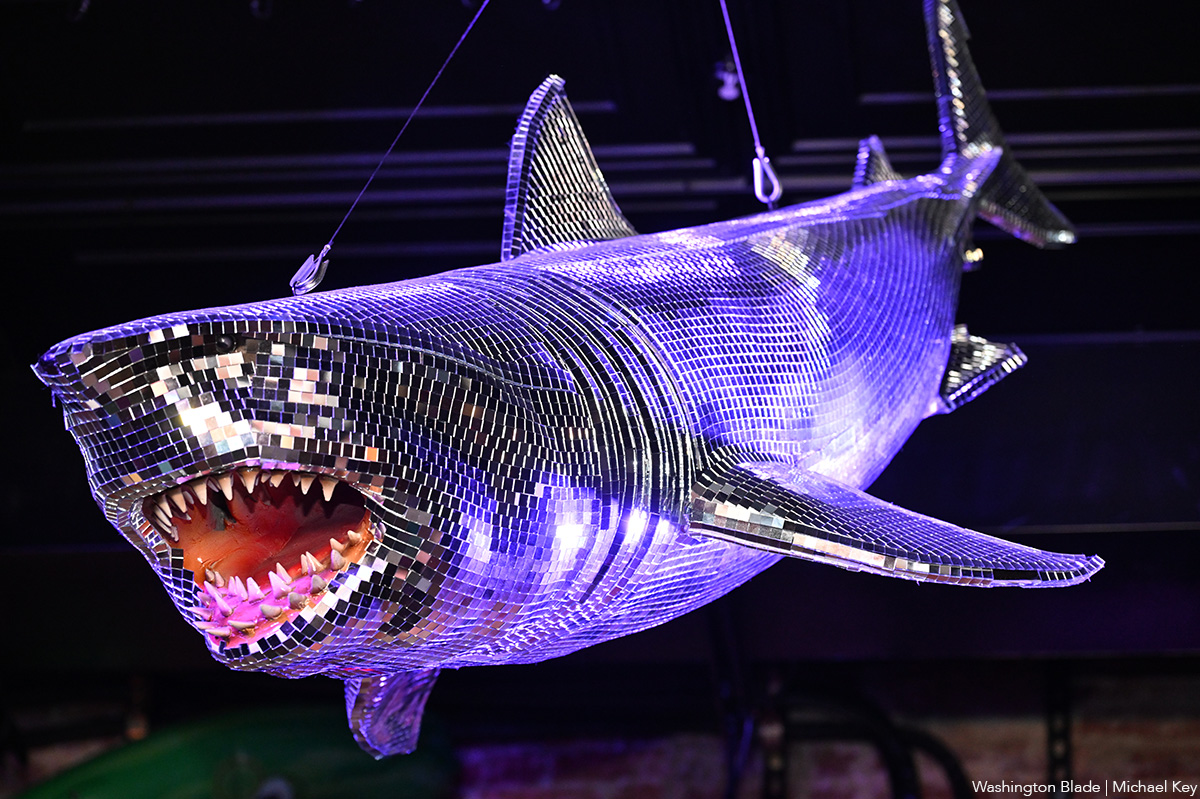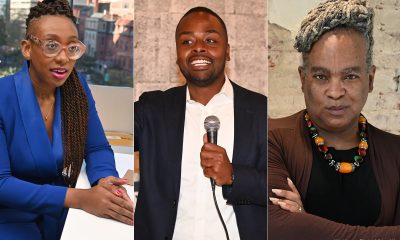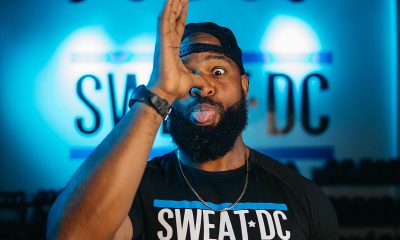Bars & Parties
Easing back-to-school jitters
LGBT parents offer advice to those enrolling kids for first time

‘All gay parents should be part of some kind of support system with other gay parents so that children can look around and say, 'gee I'm not the only one with this kind of family,’’ said local attorney and parent Susan Silber. (Washington Blade file photo by Michael Key)
Although students often experience anxiety and stress at the beginning of a new school year, the same can hold true for parents, particularly for LGBT parents unsure of how a new school and its teachers and administrators will accept their families.
Richard Gervase, a board member at Rainbow Families D.C., a nonprofit organization for LGBT families and their allies, has a son entering fourth grade and another starting kindergarten at a private school.
Visiting your child’s school and speaking to the teacher and principal about your family is the best advice Gervase said he has for LGBT parents sending their kids to school for the first time.
“We started this whole process of working with the schools when they were in preschool,” said Gervase. “Get in as early as possible to meet with the teacher … even before school and just start the conversation about your family. You can’t control the random things that another child might say or if another family has issues about our family, but to have the teacher be kind of primed and kind of on your side is really important.”
Susan Silber, an attorney in Takoma Park, has two adult children, a daughter, 27, and son, 21. She agrees that getting to the teachers and administrators early helps, but she emphasized it’s important to describe your family to school officials in a way that is familiar to the child.
“The most important thing is that people describe the family to the teacher or the school administrators in the way the child knows the family,” said Silber. “The child should get support reflected back of their real family rather than having to distort their own image based on some sense of what a family should be.”
Gervase echoed those sentiments.
“We go by Daddy and Papa to the kids,” said Gervase. “We have experienced on the playground before, I’m Papa, where some other parent would call me Daddy. It’s kind of like calling someone named Jane, Susan or Bob. It’s a completely different person in the child’s life.”
John Parkhurst has twin boys who started fourth grade in public school this week and he adds talking to other gay parents really helps.
“Choosing a school, and one where you know there are other gay families and you know the environment is favorable and highly diverse.” said Parkhurst. “I talked to other gay parents and went to a school several of my friends had chosen.”
Silber agreed that finding other LGBT parents is important.
“All gay parents should be part of some kind of support system with other gay parents so that children can look around and say, ‘gee I’m not the only one with this kind of family,’” said Silber. “It should be something people think about, making sure that their kids know other kids with gay families.”
There are other issues that may surface that do not have directly to do with the parent’s sexual orientation. Gervase and his partner adopted both of their children from abroad. That aspect of their family needs to be discussed as well. Teachers need to know how open the family is about the child being adopted.
“We got to know what kinds of assignments and projects they did that might touch on family issues,” said Gervase. “A lot of schools are avoiding [Mother’s Day and Father’s Day] assignments. There are other things to be on the lookout for, a lot of younger classes asked the kids to bring in a baby picture or family picture.”
“The teachers, every single year, have been just fine to say, ‘well you can just do you dad instead,” said Parkhurst when asked abut Mother’s Day projects in the classroom. “So every year they’ve brought me home something on Mother’s Day.”
These kinds of assignments need to be discussed because a child who is adopted may not have any baby pictures because they may have been adopted when they were older. Some classes have students create family trees that could raise the same issues and questions.
“As part of the initial conversation with the teacher, we’ve asked to think through any assignments, to give them some ideas about the kinds of things we might be concerned about,” said Gervase.
When meeting with your child’s teacher, Gervase suggests not only offering to be a resource, but bringing some resources, such as books or articles on LGBT families.
“We always tried to see ourselves as partners in educating the teacher or teachers and administration and, in general, I think that is really appreciated,” said Gervase. “There may be a little bit of nervousness, on the school’s end, if you’re the first, or they are concerned about saying something wrong. I think you really can disarm that by coming in and being really comfortable and asking if they have any questions.
Gervase and Silber suggest offering yourself as a resource for when issues arise in the classroom.
“You can sort of make this alliance where you’re not critical of the teacher but you want to be a resource so that if something happens, she might even turn to you and talk about how to respond,” said Gervase. “For example, a question of gay marriage came up in the classroom, and the teacher called on us to talk about it.”
“I think every parent should act as a mentor, almost diplomat, to try to raise issues,” said Silber. “Figure out how to sensitize the co-parents or co-teachers to these realities we have.”
Gervase suggested bringing in a copy of the Welcoming School guide, produced by the Human Rights Campaign.
“[It] has been super helpful to us,” said Gervase. “When [the kids] were in preschool, we actually wrote some stuff like that.”
“Give it to every principal, because there is so much good information,” Gervase. “First, [parents should] read it themselves if they don’t already know about it.”
The guide includes a list of resources where teachers can learn more.
“There is a tremendous bibliography, so one of the things our school did was take that bibliography and every teacher read one of the books that had a family diversity theme,” said Gervase. “They each used it in the classroom for discussion then met and compared notes to figure out which ones worked well at which age.”
“There are also legal issues around actual legal authority to do things,” said Silber.
She said it’s important to ensure the school knows that the parent who may not have adopted the child has the authority to do things like pick the child up from school or be called when something goes wrong and the other parent is not home.
“The ideal thing is to use the school experience as a way of reminding yourself that both parents should have legal authority,” said Silber. “In the absence of [adoption] at least have some legal documents that give authority from the legal parent to the other parent.”
Parkhurst admits that one of the toughest aspects of back-to-school season has nothing to do with being a gay parent — but rather just being a parent in general.
“Looking at their little faces when they’re trying to be brave. They do what they’re supposed to do and be where they are supposed to be, and the parents just sort of stand there and let them go,” said Parkhurst. “The first … one of my boys was really good and strong about it, but … when he saw me at 3:15, his little lip started to quiver, but it wasn’t anything compared to me. Teachers were pulling me aside and giving me a box of Kleenex.”
a&e features
Your guide to D.C.’s queer New Year’s Eve parties
Ring in 2026 with drag, leather, Champagne, and more

With Christmas in the rear view mirror, we can turn our attention to ringing in a much-anticipated New Year with a slew of local LGBTQ parties. Here’s what’s on tap.
Pitchers
This spacious Adams Morgan bar is hosting the “Pitchers’ Perfect New Year’s Eve.” There will be a midnight Champagne toast, the ball drop on the big screens, and no cover, all night long. The bar doesn’t close until 4 a.m., and the kitchen will be open late (though not until close). All five floors will be open for the party, and party favors are promised.
Trade
D.C.’s hottest bar/club combo is leaning into the Shark motif with its NYE party, “Feeding Frenzy.” The party is a “glitterati-infused Naughty-cal New Year’s Even in the Shark Tank, where the boats are churning and the sharks are circling.” Trade also boasts no cover charge, with doors opening at 5 p.m. and the aforementioned Shark Tank opening at 9 p.m.. Four DJs will be spread across the two spaces; midnight hostess is played by Vagenesis and the two sea sirens sensuously calling are Anathema and Justin Williams.
Number Nine
While Trade will have two DJs as part of one party, Number Nine will host two separate parties, one on each floor. The first floor is classic Number Nine, a more casual-style event with the countdown on TVs and a Champagne midnight toast. There will be no cover and doors open at 5 p.m. Upstairs will be hosted by Capital Sapphics for its second annual NYE gathering. Tickets (about $50) include a midnight Champagne toast, curated drink menu, sapphic DJ set by Rijak, and tarot readings by Yooji.
Crush
Crush will kick off NYE with a free drag bingo at 8 p.m. for the early birds. Post-bingo, there will be a cover for the rest of the evening, featuring two DJs. The cover ($20 limited pre-sale that includes line skip until 11 p.m.; $25 at the door after 9 p.m.) includes one free N/A or Crush, a Champagne toast, and party favors (“the legal kind”). More details on Eventbrite.
Bunker
This subterranean lair is hosting a NYE party entitled “Frosted & Fur: Aspen After Dark New Year’s Eve Celebration.” Arriety from Rupaul Season 15 is set to host, with International DJ Alex Lo. Doors open at 9 p.m. and close at 3 p.m.; there is a midnight Champagne toast. Cover is $25, plus an optional $99 all-you-can-drink package.
District Eagle
This leather-focused bar is hosting “Bulge” for its NYE party. Each District Eagle floor will have its own music and vibe. Doors run from 7 p.m.-3 a.m. and cover is $15. There will be a Champagne toast at midnight, as well as drink specials during the event.
Kiki, Shakiki
Kiki and its new sister bar program Shakiki (in the old Shakers space) will have the same type of party on New Year’s Eve. Both bars open their doors at 5 p.m. and stay open until closing time. Both will offer a Champagne toast at midnight. At Kiki, DJ Vodkatrina will play; at Shakiki, it’ll be DJ Alex Love. Kiki keeps the party going on New Year’s Day, opening at 2 p.m., to celebrate Kiki’s fourth anniversary. There will be a drag show at 6 p.m. and an early 2000s dance party 4-8 p.m.
Spark
This bar and its new menu of alcoholic and twin N/A drinks will host a NYE party with music by DJ Emerald Fox. Given this menu, there will be a complimentary toast at midnight, guests can choose either sparkling wine with or without alcohol. No cover, but Spark is also offering optional wristbands at the door for $35 open bar 11 p.m.-1 a.m. (mid-shelf liquor & all NA drinks).
Bars & Parties
Mixtape Sapphics hosts holiday party on Dec. 13
‘Sugar & Spice’ night planned for Saturday

Mixtape Sapphics will host “Sapphic Sugar & Spice: A Naughty-Nice Mixtape Holiday Party” on Saturday, Dec. 13 at 4 p.m. at Amsterdam Lounge.
This is a festive, grown holiday party for queer women and sapphics 35 and older at Revolt’s Christmas pop-up. There will be music, joy, and an optional White Elephant.
This is Mixtape Sapphics’ first-ever holiday party — a cozy, flirty, intentionally grounded night created just for queer women and sapphics 35+ who want real connection, festive joy, and a warm place to land at the end of the year.
Tickets start at $13.26 and can be purchased on Eventbrite.
Bars & Parties
Impulse Group DC to host fundraiser
Giving Tuesday and Happy Hour held at Thurst Lounge

Impulse Group DC, a local advocacy organization, will host “Giving Tuesday and Happy Hour” on Tuesday, Dec. 2 at 6 p.m. at Thurst Lounge.
This event is a special happy hour fundraiser filled with good vibes, great food, and community connection. DJ Obie will be on deck keeping the energy high while you enjoy tacos, cocktails, and the kind of atmosphere only Thurst can deliver.
A portion of every signature cocktail sold goes directly toward supporting Impulse Group D.C.’s work in sexual health, mental health, harm reduction, and social justice for the D.C. community.
Admission is free and more details are available on Eventbrite.












